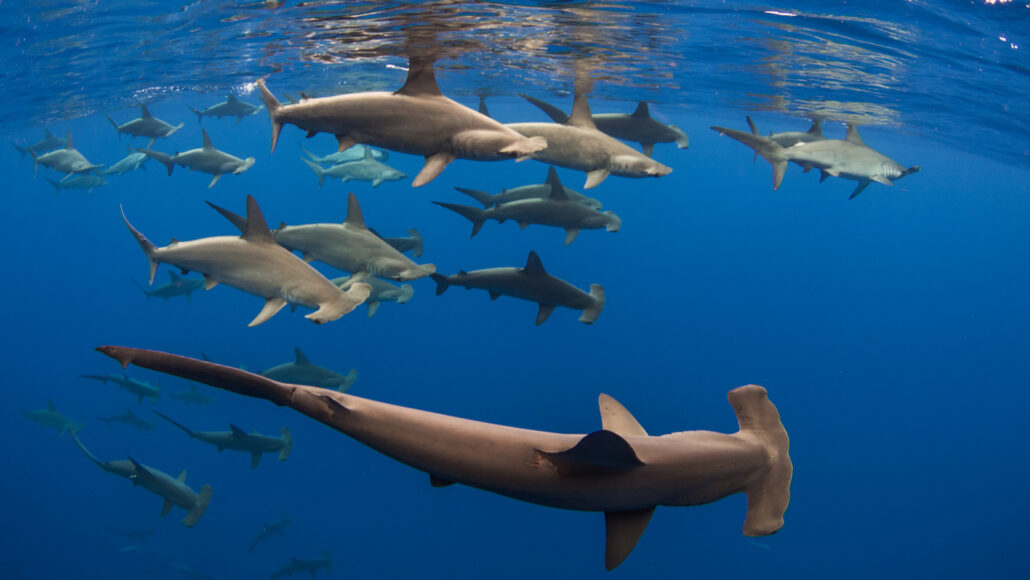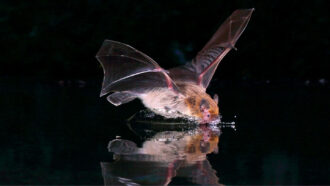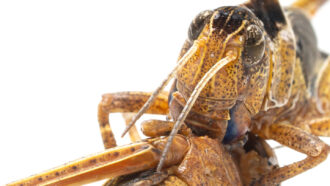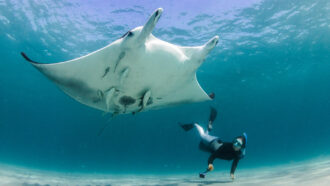Why some hammerhead sharks seem to ‘hold their breath’ during dives
These fish may close their gills to stay warm when going deep

Scalloped hammerhead sharks off the coast of Hawaii may close their gills to hold on to their warmth when diving hundreds of meters below the surface, new research suggests.
Deron Verbeck
By Freda Kreier
Even fish sometimes hold their breath in cold, dark, deep water.
Scalloped hammerhead sharks living near Hawaii spend their days basking in warm surface waters. But at night, these fish hunt for squid and other prey in the cold ocean depths hundreds of meters below the surface. The sharks may hold on to body heat in the frigid waters by suppressing the use of their gills while diving, essentially “holding their breath” for around an hour at a time, researchers report in the May 12 Science.
Whales and other deep-diving mammals are known to hold their breath (SN: 9/23/20). But this is the first time the behavior has been spotted in diving fish, says Mark Royer, a shark physiology and behavior researcher at the University of Hawaii at Manoa in Honolulu.
Sharks and other fish are ectotherms, meaning that their body temperature is largely controlled by the warmth of the water around them. Fish lose and gain a lot of body heat while breathing through their gills, which snag oxygen from water passing through the organ.
“Gills are like giant radiators strapped to your head,” Royer says, explaining that they leak heat. Because of this, a lot of shark species in the tropics tend to stick to roughly the first 100 meters of sun-heated water near the ocean surface, where temperatures hover around 26° Celsius. But tags attached to scalloped hammerhead sharks (Sphyrna lewini) — a species found in coastal waters all over the tropics — revealed that these sharks take nightly, hour-long dives up to 1,000 meters below the surface.
At these depths, water temperatures can get as low as 5° C — far too cold for a tropical shark. To find out how the sharks endured such frigid temperatures, Royer and his colleagues attached specially designed instruments to the backs of sharks that had gathered in a shallow bay off Oahu to mate.
For the next 23 days, these sensors tracked how the sharks moved, how deep they swam, and how their internal temperature changed. “It was kind of like attaching a Fitbit to a shark,” says Royer. “It allowed me to get precise details on what the shark was doing.”
Sharks, the data show, went on V-shaped dives to the depths — plunging hundreds of meters before firing straight back up “like a missile,” says Royer. But strangely, the body temperature of diving sharks barely budged for the bulk of the dive. It was only when the sharks slowed their ascent at a depth of around 290 meters, where the water is a little cooler than at the surface, that their body temperature dropped by an average of 2.8 degrees C.
The fish had to be shutting off their gills for most of the dive to hold on to their heat, the researchers concluded. It was only when the sharks had returned to a safer depth temperature-wise that they may have reactivated their gills — taking in oxygen for the first time in around an hour and sucking in cold water in the process.
Subscribe to Science News
Get great science journalism, from the most trusted source, delivered to your doorstep.
Holding on to their heat while diving could help sharks move quickly in the deep ocean, says Julia Spaet, a shark ecologist at the University of Cambridge. While it is “absolutely possible” that these hammerhead sharks do this by suppressing gill activity, scientists will need to get direct evidence using cameras or other means to prove that it is true, she says.
At least one video from a deep-sea dive hints that this is the case. The gills of a scalloped hammerhead roaming at a depth of 1,000 meters near Tanzania appeared to be closed in footage captured a few years ago, the researchers note in their paper. This, along with the new study’s find that hammerheads hold on to their body heat, makes Royer “very confident” that sharks are in fact holding their breath. “It just goes to highlight how extraordinary this species is,” he says.







